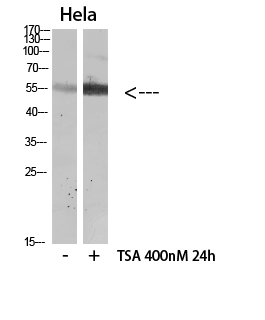HNF-4α (Acetyl Lys106) Polyclonal Antibody
- 货号:YK0081
- 应用:WB;ELISA
- 种属:Human;Rat;Mouse
- 简介:
- >>AMPK signaling pathway;>>Maturity onset diabetes of the young
- 基因名称:
- HNF4A HNF4 NR2A1 TCF14
- 蛋白名称:
- Hepatocyte nuclear factor 4-alpha (HNF-4-alpha) (Nuclear receptor subfamily 2 group A member 1) (Transcription factor 14) (TCF-14) (Transcription factor HNF-4)
- 免疫原:
- Synthetic Acetyl peptide from human protein at AA range: 106
- 特异性:
- The antibody detects endogenous HNF-4α when Acetyl occurs at Lys106
- 组成:
- Liquid in PBS containing 50% glycerol, 0.5% BSA and 0.02% sodium azide.
- 来源:
- Polyclonal, Rabbit,IgG
- 稀释:
- WB 1:500-2000, ELISA 1:10000-20000
- 纯化工艺:
- The antibody was affinity-purified from rabbit antiserum by affinity-chromatography using epitope-specific immunogen.
- 储存:
- -15°C to -25°C/1 year(Do not lower than -25°C)
- 其他名称:
- Hepatocyte nuclear factor 4-alpha (HNF-4-alpha) (Nuclear receptor subfamily 2 group A member 1) (Transcription factor 14) (TCF-14) (Transcription factor HNF-4)
- 背景:
- The protein encoded by this gene is a nuclear transcription factor which binds DNA as a homodimer. The encoded protein controls the expression of several genes, including hepatocyte nuclear factor 1 alpha, a transcription factor which regulates the expression of several hepatic genes. This gene may play a role in development of the liver, kidney, and intestines. Mutations in this gene have been associated with monogenic autosomal dominant non-insulin-dependent diabetes mellitus type I. Alternative splicing of this gene results in multiple transcript variants encoding several different isoforms. [provided by RefSeq, Apr 2012],
- 功能:
- alternative products:Additional isoforms seem to exist,disease:Defects in HNF4A are the cause of maturity onset diabetes of the young type 1 (MODY1) [MIM:125850]; also shortened MODY-1. MODY [MIM:606391] is a form of diabetes that is characterized by an autosomal dominant mode of inheritance, onset in childhood or early adulthood (usually before 25 years of age) and a primary defect in insulin secretion. The clinical phenotype of MODY1 is characterized by severe insulin secretory defects, and by major hyperglycemia associated with microvascular complications.,function:Transcriptionally controlled transcription factor. Binds to DNA sites required for the transcription of alpha 1-antitrypsin, apolipoprotein CIII, transthyretin genes and HNF1-alpha. May be essential for development of the liver, kidney and intestine.,miscellaneous:Binds fatty acids.,online information:Hepatocyte nuclear fac

- Western blot analysis of mouse-lung mouse-kidney mouse-liver lysate, antibody was diluted at 500. Secondary antibody(catalog#:RS0002) was diluted at 1:20000




